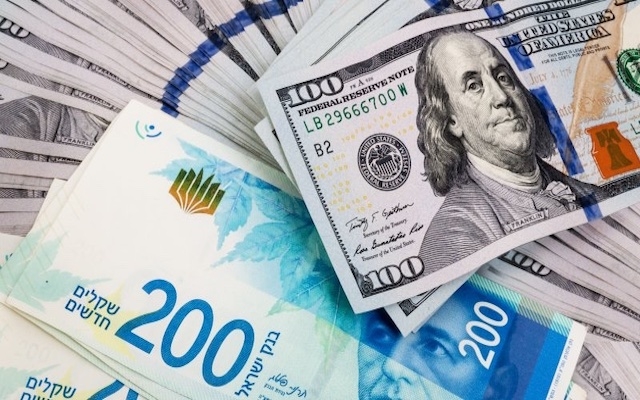Despite the ongoing conflict in Israel, the shekel's recent strengthening trend against the dollar continues to unfold. Today, the dollar experienced a decline of 1.4% against the shekel, with its exchange rate dropping below 3.80 NIS. This marks a decrease from the pre-war period when the dollar was trading at 3.86 NIS. Similarly, the euro also witnessed a slight dip in value against the shekel, settling at 4.1260 shekels.
The depreciation of the dollar can be primarily attributed to its global weakening, which is a consequence of better-than-expected inflation figures in the United States. In October, annual inflation in the U.S. moderated to 3.2%, prompting investors to anticipate the eventual end of the high-interest-rate era. There is growing speculation that the Federal Reserve will commence interest rate reductions on the dollar at the outset of the second quarter of 2024.
Citadel Investments Founder Ken Griffin says the Federal Reserve will lose credibility if it cuts interest rates too soon pic.twitter.com/LZOhYrtgQB
— Barchart (@Barchart) November 15, 2023
Since the onset of the conflict, the dollar had surged against the shekel, reaching its peak at nearly 4.10 shekels just a week and a half ago. Subsequently, it embarked on a downward trajectory.
Several factors contributed to this abrupt strengthening of the shekel. Firstly, there was a prevailing hypothesis that the conflict would primarily impact the southern region of Israel. Secondly, the dollar's depreciation on a global scale played a role. Furthermore, the Bank of Israel's substantial foreign exchange sales, exceeding 8 billion dollars in approximately three weeks, further fueled the shekel's rapid appreciation.
On the horizon, Wednesday will bring the release of inflation data in Israel. Market predictions suggest that annual inflation will continue its decline, with the consumer price index for October expected to increase by 0.4-0.5%. This would lead to a slight moderation in the annual inflation rate, settling at 3.7%, as compared to the previous month's 3.8%.
BREAKING: The Bank of Israel estimates the war is costing the economy around $600 million a week
— The Spectator Index (@spectatorindex) November 9, 2023
However, despite the anticipated decrease in inflation within Israel, interest rate cuts are not currently in the cards. According to economists at Bank Hapoalim, "as long as the conflict persists, along with the associated budgetary uncertainties, interest rates will remain unchanged." At this juncture, the Bank of Israel appears to favor targeted support for small businesses affected by the conflict, primarily through subsidizing financing sources for bank loans. The governor of the Bank of Israel has emphasized in recent speeches that the paramount goal is market stability, with interest rate reductions potentially exerting pressure on the shekel's depreciation.


